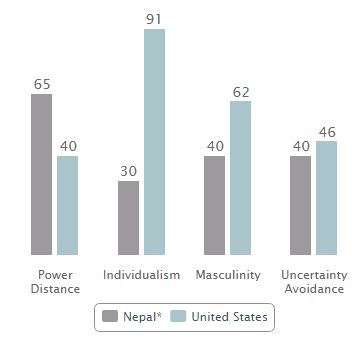
There is nothing more powerful than an idea whose time has come.
-Victor Hugo
Most of the B-schools and business community in Nepal are supporting and motivating aspiring and active entrepreneurs in developing great ideas into great companies. The entrepreneurial and startup eco-system have been rallying the people to take up entrepreneurship as a career option. It is a good thing as startups contribute to economic dynamism by spurring innovation and injecting competition.
Each year, hundreds of students enroll in entrepreneurship courses. The aspirants are interested in learning entrepreneurial skills to start a business, a significant number fail to launch a new business in the near term. This mismatch of entrepreneurial ambitions versus actually launching businesses exists for students. Geert Hofstede Cultural Dimension might be better equipped to explain this reason.
Geert Hofstede cultural model describes the effects of a society's culture on the values of its members, and how these values relate to work related behavior. The four fundamental cultural dimensions are – 1) Power Distance (the extent to which the less powerful members of organizations and institutions accept and expect that power is distributed unequally), 2) Individualism (degree to which people in a society are integrated into groups), 3) Masculinity (a preference in society for achievement, heroism, assertiveness and material rewards for success) and 4) Uncertainty Avoidance (a society's tolerance for ambiguity). Learn more about Geert Hofstede Cultural Model - https://en.wikipedia.org/wiki/Hofstede%27s_cultural_dimensions_theory and https://geert-hofstede.com/national-culture.html
source: https://geert-hofstede.com/nepal.html
If we compare these cultural dimensions with the United States, we do lack ingredients of that can make us a good entrepreneur. The power distance compared with United States is higher which indicates that hierarchy is clearly established and executed in society in Nepal whereas lower score signifies that people question authority and attempt to distribute power. Similarly, the risk taking, assertive and decision making values which is essential for any entrepreneur is denoted by individualism and masculinity. Based on the scores Nepali culture has shortages in these areas, as well. Whereas, a lower degree in uncertainty avoidance in both the cultures shows more acceptance of differing ideas.
There is the need for something new, something different, that helps to identify and analyze entrepreneurial mindset. For aspiring entrepreneurs, new tools are necessary to develop the attitudes and ideas that can lead to effective business planning and successful ventures of all types. The entrepreneurial courses and activities are a step in the right direction. The focus of these courses and activities is to engage students in customer discovery early, and test the major hypotheses of the business model. While this is a valuable approach in entrepreneurship education, but can only begin to take shape after a new business idea is formulated, which requires a risk taking entrepreneurial mindset. The need to develop the skills and attitude to develop and act on innovative business opportunities is important but might not be enough. If we want to foster entrepreneurial eco-system, we need to raise entrepreneurs from early on to develop the entrepreneurship culture in Nepal.
This blog is based on the book The Opportunity Analysis Canvas by Dr. James V. Green.

Congratulations @ruchin! You received a personal award!
You can view your badges on your Steem Board and compare to others on the Steem Ranking
Vote for @Steemitboard as a witness to get one more award and increased upvotes!